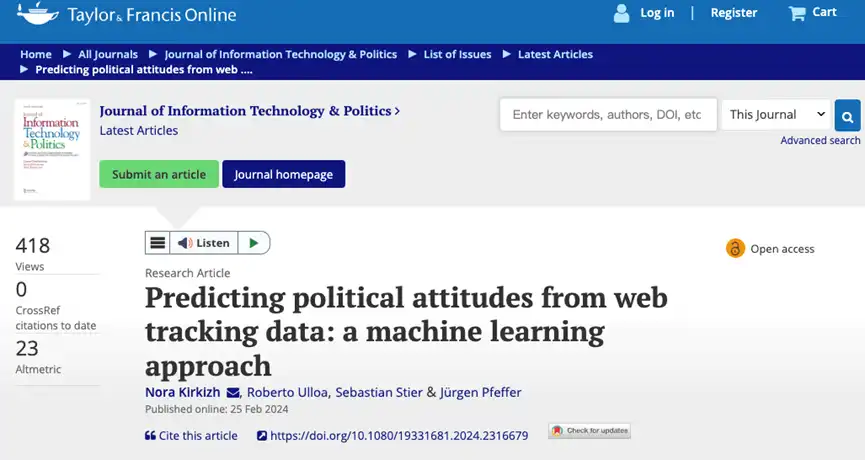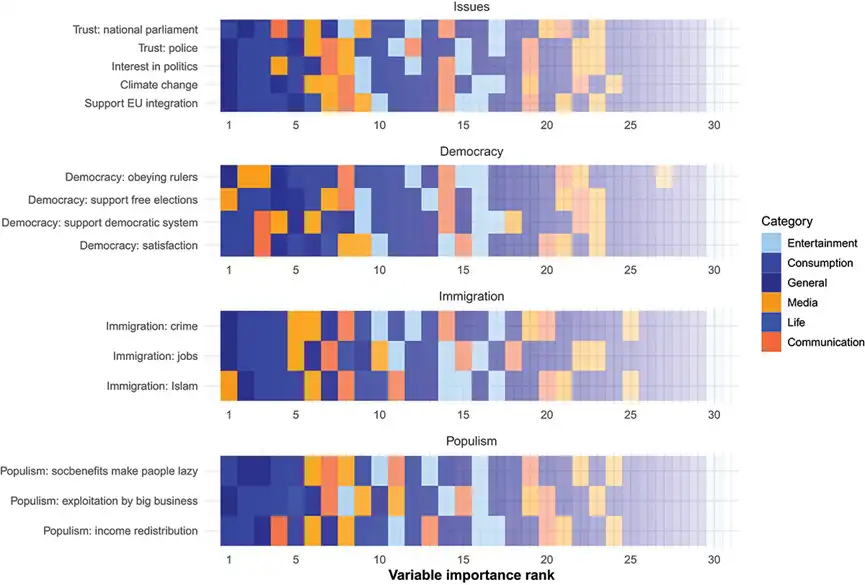Can web browsing behavior predict political attitudes? Behavioral analysis based on 19 million website visits
**  **
**
As political polarization intensifies and populism rises, voters 'political preferences have become easier to detect through their digital footprints. This may put voters at risk of being influenced by political actors. The widespread use of the Internet and social media has generated a large amount of digital footprint data, providing new opportunities to study people's political attitudes and behaviors. In the past, researchers have tried to predict individuals 'political tendencies by analyzing online behavioral data such as social media activities, and have achieved certain results, but accurately extracting political attitude signals remains challenging. Social media behavior may not fully reflect true political tendencies, and data privacy and cybersecurity issues are increasingly becoming ethical considerations, so using this data while protecting privacy remains a difficulty. Still, exploring the potential of digital footprint data to predict political attitudes is of great value in understanding voter behavior, optimizing election strategies, and promoting public participation, prompting researchers to develop new methods and models to improve the accuracy and efficiency of predictions.
A recent study surveyed data on more than 19 million website visits from 1003 users in Germany and examined the association between these data and behaviors in five areas: immigration, democracy, policy issues (such as climate change and the European Union), populism and trust, to explore whether website selection accurately predicts political attitudes. Research found that individuals 'website visit records have certain limitations in identifying political attitudes. The most effective machine learning algorithms can predict an individual's interest in politics and attitude towards democracy, but this depends on the setting of model parameters. Although website categories show certain patterns, they can only partially distinguish individuals with anti-immigrant or pro-immigrant attitudes from individuals with populist or mainstream attitudes. This further confirms the limited reliability of the survey in measuring attitudes compared to digital footprint data, and suggests from a normative perspective that the potential for extracting sensitive political information from online behavioral data for micro-targeting is also limited.
The study aims to test the ability of website choices to predict political attitudes across a broader policy area, going beyond most previous studies that focused solely on news-related behavior or Facebook likes. Using this approach, the study attempted to identify political attitudes from individuals 'web browsing behavior, not only limited to political ideologies common in the U.S. sample, but also tested the predictive power of website selection across a broader policy area in European countries.
This research has contributed in the methodological and policy-making dimensions. From a methodological perspective, it provides a way to apply machine learning to study political attitudes measured through surveys, capable of capturing complex nonlinear patterns in the data and obtaining more reliable prediction results, driving the theoretical development of the relationship between political attitudes and web browsing behavior. In addition, the study demonstrated the potential of web tracking data as an attitude measurement tool and compared it with traditional survey measurement methods. From a normative perspective, research reveals that third parties may understand the amount of information about voters through browsing history, which is closely related to the development of digital privacy policies and provides new ideas for future research and mechanism establishment using web tracking data.
**  随机森林模型中对政策问题、民主、移民和民粹主义态度的重要性排名**
随机森林模型中对政策问题、民主、移民和民粹主义态度的重要性排名**
description:Fading effects are used in the figure to indicate the decline in importance for each domain category
attention to our
